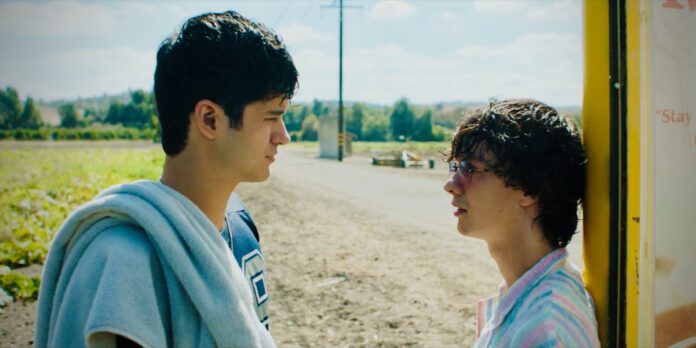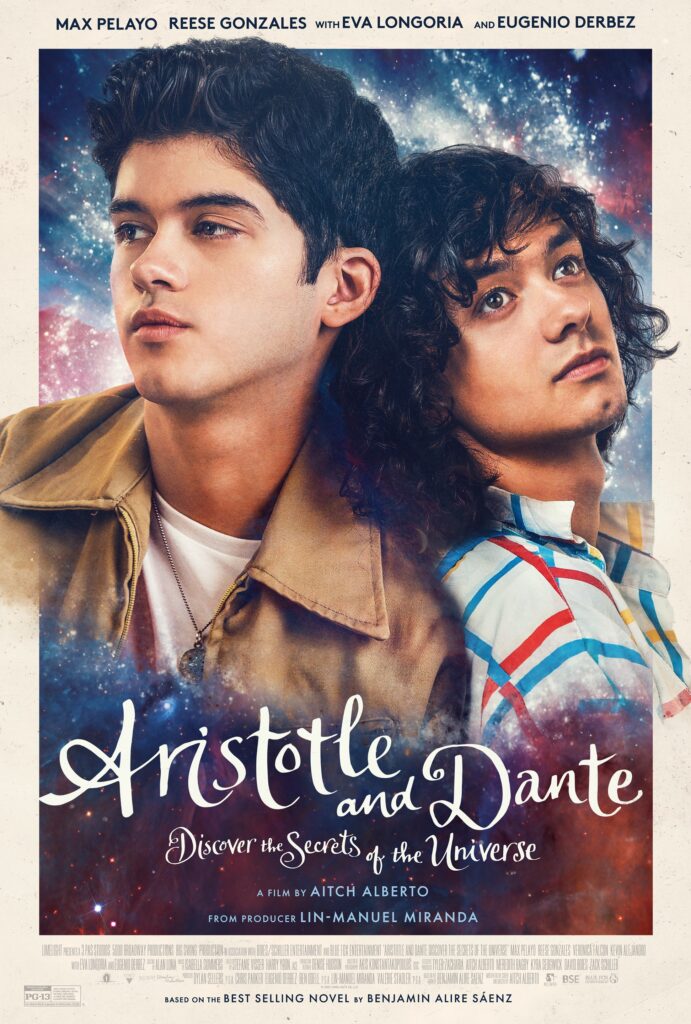
Trans writer/director Aitch Alberto’s makes an auspicious directorial debut with her adaptation of the award-winning YA novel “Aristotle and Dante Discover the Secrets of the Universe,” by Benjamin Alire Sáenz.
The film, opening Sept. 8 at the AMC Neshaminy, is set in 1987 El Paso, where Mexican American teenagers, Aristotle, aka Ari (magnetic newcomer Max Pelayo) learns to swim with the assistance of the outgoing Dante (Reese Gonzales). The teens become fast friends and hang out all summer until Dante’s family moves away to Chicago for a year. But when Dante returns, having come out as gay, the dynamic between the friends changes slightly. Alberto handles the emotional arcs of the characters with considerable aplomb.
The filmmaker spoke with PGN about her magical new film.
I’m curious, are you more of a moody, brooding loner and on Team Aristotle, or an outgoing aesthete and on Team Dante?
I always thought I was a Dante, but the reality is I was always an Aristotle. I still have the Aristotle in me. I hope I evolve into the Dante! I think I’m getting there.
The book is beloved. Was there pressure to capture the magic of the novel for fans?
It was important for me to not diverge too much from what the book was. It was a long process to allow it to become my own. I wanted to honor it. The pressure came later when I realized how beloved the book was. I let go of the book and allowed myself to take creative freedoms and always checking in with myself to keep the essence of the book, which is what I loved about it. Adaptations sometimes veer too far off from the source material, and I didn’t want to do that. I wanted to hold true to the book but also remember the medium I was working so I could externalize Ari’s internal journey.
The film is very queer inclusive, but it is also very much about Mexican American identity. What observations do you have about telling queer Latino stories?
It was important not to box it in, or limit what the gaze was. I never felt I was telling a queer story, or a Latino story. I was telling a story celebrating the people I love and my own lived experience, which is often void of the conversation of our queerness or being Latino. Both of those identities inform our perspectives.
The film is beautifully shot with Edward Hopper-esque images, and moments of magical realism. Can you talk about approaching the film visually?
I wanted to capture a world that felt grounded, where magic is possible. How do I embrace the very grounded surroundings, such as a red-brick wall, and find the magic in that. I love that you refer to it as Ed Hopper, because that is what I had in mind. It was finding a way of using the camera, especially in the scenes with Ari and Dante. There is not much going on around them. I wanted there to be a subconscious, fairy-tale quality that the world disappears when they are together. Every shot I tried to find the slight surrealness of what that moment can be.

Can you talk about using the voiceover, the needle drops, and the DJ commentary, and even the TV footage of ACT UP to guide the viewer (and the characters) through the story?
I never wanted to hold anyone’s hand through it. YA stories are so literal, and so on the nose, that I wanted the audience to trust me with what I was doing. It is all really intentional. It’s about finding those moments where we are not forgetting the world around us, but it does not have to be so overly present for us to feel the fear of the AIDS and ACT UP footage.
I also wanted it to reflect what is true for me, and true for the people in my life. I wanted to make it as authentic as possible.
What can you say about depicting the bromantic dynamic between Ari and Dante?
It was building a trust between Max and Reece. They were these characters innately, spiritually, fundamentally. It was making sure they trusted me and each other and how we were using the camera. And then I could easily guide them through their natural instincts.
Ari never says he’s gay. He always says he loves Dante. That is what it is about — love transcending sexuality. That was at the root of this story — both boys’ North Star while going through this. It was an undeniable connection found with an unexpected person and in an unexpected place, void of whatever identity you claim.
In my life, pre-transition, boys would fall in love with me, and it would confuse them, because they really saw me. It didn’t change their sexuality. They just fell in love with me, and I think that’s similar to what’s happening with Ari and Dante.
As a trans filmmaker, why did you choose not to make a trans film?
I think it is a trans film. I am a trans filmmaker, so my lens will always be trans. But I don’t think it has to be overtly about transness. My journal mirrors that of Aristotle. It’s me not allowing myself to feel the love for myself and the love around me. And missing that and taking so long to step into truth and not having people see me and say you’re allowed to be this person. It mirrors my experience, even though it isn’t 1:1.
I love the character of Tia Ophelia (Marlene Forte), who gives Ari so much love and support, but he doesn’t quite realize it. What can you say about someone who influenced your self-acceptance?
Non-queer folks don’t recognize who Tia is in the story — that she sees him. She is not as prominent in the book as in the film. Someone had to make it OK for him to be himself, even if she was never able to say it out loud. Queer people are the only ones who recognize that. My self-love took a long time. I pretended to be many versions, but there was a moment where it came to me not wanting to die living a lie and realizing that I had love and support around me. Despite my family’s ideas of who I should be, I knew that they would love me no matter what. But it was me fearlessly having that conversation with myself and being willing to lose those people in order to live truthfully.